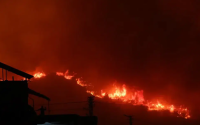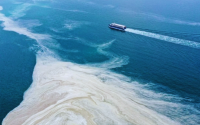6 January 2006
But he said Australia was the last place in the world that should take in climate refugees given its high per capita emission rate.
Sea levels are predicted to rise between 14cm and 32cm by 2050 as a result of rising atmospheric temperatures melting ice sheets and glaciers.
"I think it's legitimate that Tuvalu and places like that should be compensated but you really don't want to put those people in a country with the highest per capita emissions," the Australian National University professor said yesterday.
"You could make the argument that the more people you bring here the worse the total emissions for the world."
And the world's largest greenhouse gas-polluting regions - Europe and the US - should shoulder the overwhelming burden for any compensation, he said.
The federal Opposition's Pacific climate change policy calls for the establishment of a Pacific climate change centre and alliance, the creation of an international coalition to accept climate change refugees and training to assist those evacuated to adapt to new countries.
"Labor believes that Australia should, as part of an international coalition, do its fair share to accept climate change refugees as part of our humanitarian immigration program," the policy states.
Bob Sercombe, Labor's Pacific Island Affairs spokesman, said yesterday islands such as Tuvalu, Kiribati and PNG's Carteret Islands faced salt-water inundation and extreme weather events and said it was "time for Australia to establish a partnership with our drowning Pacific neighbours".
But Professor McKibbin said the policy was fraught with difficulties - not the least of which was how to define a climate refugee.
"If it stops snowing in New Zealand, does Australia then take all the New Zealanders?" he said.
An open border policy for environmental refugees could also force a government, concerned about uncontrolled immigration, into a position where it felt compelled to deny climate change, he warned.
Australian National University geophysicist Kurt Lambeck yesterday endorsed the "spirit of the policy".
But he warned it was not just sparsely populated islands such as Tuvalu that were at risk from sea level rise.
"There are areas (such as Bangladesh) also at risk, with much larger populations," Professor Lambeck said.
"I see no reason why a country such as Australia couldn't take small populations (of climate refugees) but you have to be careful you don't open the doors for everybody."






